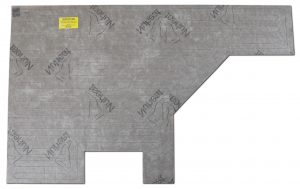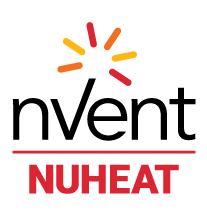Radiant heat is a comfortable, efficient, and safe way to warm any space. Now more than ever, home builders and multi-unit developers are taking advantage of the uniform, silent, and invisible way to deploy radiant heat indoors: electric radiant floor heating. In this post, we examine what makes nVent NUHEAT systems such an attractive alternative to forced air systems.
Forced Air Heating
Forced air systems are ubiquitous in North America and are often seen as the default heating method for residential buildings. Forced air systems typically use a natural gas furnace to heat the air and a powerful fan to push that hot air throughout the living space.
The key advantages of a forced air system are…
• Rapid heating: When the controller calls for heat, the furnace can quickly heat the air and push it throughout the home.
NOTE: Air is easy to heat rapidly because it has low thermal mass. Paradoxically, low thermal mass makes air a relatively poor way of heating objects, and occupants of a building.
• Cost effective: A natural gas furnace is typically one-half to two-thirds the price of an electric heat pump and the current price of natural gas means that it is often less expensive than electricity when used for home heating.
NOTE: The price advantage in favor of natural gas vs. electricity is shrinking over time and the price of fossil fuels is more volatile than that of electricity.
• Reliability: Natural gas furnaces use proven technology that has proven to be very reliable over a long period of time. Compared to hydronic systems, the ductwork used in a forced air system is less prone to failure and requires less maintenance.
Key disadvantages associated with forced air heating are…
• Potential health risks: Forcing air throughout the home also means that dust, bacteria, pathogens, allergens, mold spores, and more are possibly being circulated around the home too. If the system is heating outside air and drawing it into the home, the relative humidity inside the home is reduced substantially. Low humidity contributes to dehydration, which can lead to dry skin, dry eyes, and even nosebleeds. Eczema or acne flare ups can be worse in drier air and dry eyes can cause soreness, blurred vision, and increased risk of eye infections. Malfunctioning natural gas furnaces can produce carbon monoxide, an odorless, highly poisonous gas.
• Poor temperature regulation & limited ability to “zone heat”: Forced air heating typically uses one thermostat to control the furnace, wasting energy by sending heat to unused portions of the home. Also, by the time the heated air reaches each room through widely varying lengths of ductwork, rooms are inevitably warmer or colder than desired, unless they are close to the thermostat. Hot air ends up concentrated near the vents and the ceiling (where it does little to make occupants more comfortable on cold days).

• Higher carbon footprint: Burning natural gas produces carbon dioxide. Producing and distributing natural gas has a much higher carbon footprint than electricity production, no matter how the electricity is produced.
• Less efficient and reduced efficiency over time: natural gas furnaces are much more efficient than they used to be, but they still require more energy to run than heat produced. Leaking ductwork and wear and tear on the furnace leads to reduced efficiency over the life of the system.
• Noise: Many modern forced air systems are much quieter than they used to be, but all forced air systems make some amount of noise.
nVent NUHEAT systems can completely replace a forced air heating system or can be used as part of a hybrid system, combining the best aspects of each. nVent NUHEAT systems have none of the drawbacks above and offer several other advantages, including the following:
nVent NUHEAT offers improved comfort because…
• nVent NUHEAT systems heat objects and occupants directly, offering improved comfort at lower ambient temperatures.
• nVent NUHEAT systems can easily be zoned by using as many thermostats as required. This ensures heat is delivered where and when it is needed, maintaining the ideal temperature in each room.
• nVent NUHEAT systems turn the entire floor into a source of heat, ensuring even heat throughout the living space.
• nVent NUHEAT systems are silent and do not circulate pollutants or negatively affect humidity.

nVent NUHEAT offers improved energy efficiency because…
• nVent NUHEAT systems heat the floor and objects touching the floor. These objects have a higher thermal mass than air, so they stay warmer for longer and transfer heat to occupants more effectively. This principle applies even more so in rooms with high ceilings because the warmest air is well above the occupants of the room. This is how nVent NUHEAT systems offer improved comfort at lower ambient temperatures.
• On-demand zone heating allows the homeowner to only heat the rooms in use.
• The nVent NUHEAT Signature wifi thermostat takes efficiency to the next level with smart-home-integrated control.
• Direct electric heating is 100% efficient (all energy consumed is turned into heat) and this does not change over the time.

nVent NUHEAT offers low cost of ownership because…
• Lower parts and installation costs
• nVent NUHEAT Custom Mats offer consistent results at the lowest possible installation cost. They ensure repeatable, perfect installation throughout any project, even with changing installers.
• nVent NUHEAT systems require no additional utility space or ductwork
• nVent NUHEAT systems are maintenance-free and even more reliable than forced air. nVent NUHEAT systems come with a 25-year warranty!
• nVent NUHEAT runs on electricity, offering a lower carbon footprint and future-proof design
• Highly efficient (see above)

Do you have questions about how nVent NUHEAT can add value to your next project? CLICK HERE to get in touch with an nVent NUHEAT multi-unit project expert and your questions answered!

